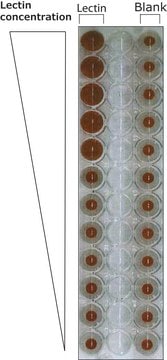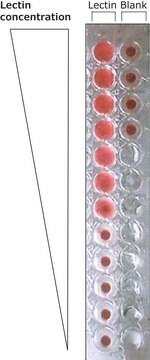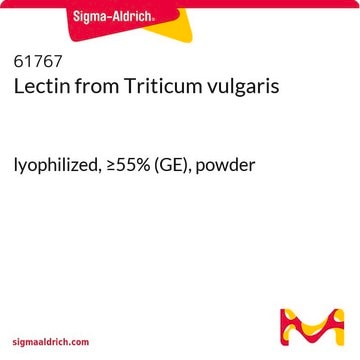19337
Lectin from Ulex europaeus-Atto 488 conjugate
Synonym(s):
Ulex europaeus agglutinin-Atto 488 conjugate
Sign Into View Organizational & Contract Pricing
All Photos(1)
About This Item
UNSPSC Code:
12352108
NACRES:
NA.32
Recommended Products
description
carbohydrate specificity α-L-Fucose
form
powder
fluorescence
λex 501 nm; λem 523 nm in PBS
storage temp.
−20°C
Application
Atto labels are designed for high sensitivity applications including fluorescence microscopy, flow cytometry, fluorescence in situ hybridization (FISH), receptor binding assays, or enzyme assays. Ulex europaeus agglutinin-Atto 488 conjugate, a green-emitting donor, may be used as FRET partner and as a marker of lectin binding.
Legal Information
This product is for Research use only. In case of intended commercialization, please contact the IP-holder (ATTO-TEC GmbH, Germany) for licensing.
Storage Class Code
11 - Combustible Solids
WGK
WGK 3
Flash Point(F)
Not applicable
Flash Point(C)
Not applicable
Personal Protective Equipment
dust mask type N95 (US), Eyeshields, Gloves
Certificates of Analysis (COA)
Search for Certificates of Analysis (COA) by entering the products Lot/Batch Number. Lot and Batch Numbers can be found on a product’s label following the words ‘Lot’ or ‘Batch’.
Already Own This Product?
Find documentation for the products that you have recently purchased in the Document Library.
Oliver J Wilson et al.
Histochemistry and cell biology, 138(4), 617-626 (2012-07-04)
Within animal skeletal muscle, focal adhesion kinase (FAK) has been associated with load-dependent molecular and metabolic adaptation including the regulation of insulin sensitivity. This study aimed to generate the first visual images of the localisation of FAK within human skeletal
Katharina Scheller et al.
Tissue engineering. Part C, Methods, 19(1), 57-67 (2012-07-18)
A general problem in tissue engineering is the poor and insufficient blood supply to guarantee tissue cell survival as well as physiological tissue function. To address this limitation, we have developed an in vitro vascularization model in which a decellularized
Yoshihiro Nishijima et al.
Genes to cells : devoted to molecular & cellular mechanisms, 17(10), 826-836 (2012-09-11)
Cell surface glycans change during the process of malignant transformation. To characterize and distinguish endometrial cancer and endometrium, we performed glycan profiling using an emerging modern technology, lectin microarray analysis. The three cell lines, two from endometrial cancers [well-differentiated type
María A Duque-Correa et al.
International journal for parasitology, 50(9), 707-718 (2020-07-14)
The caecum, an intestinal appendage in the junction of the small and large intestines, displays a unique epithelium that serves as an exclusive niche for a range of pathogens including whipworms (Trichuris spp.). While protocols to grow organoids from small
Lei Chen et al.
Nature genetics, 51(5), 777-785 (2019-04-17)
BMP/SMAD signaling is a crucial regulator of intestinal differentiation1-4. However, the molecular underpinnings of the BMP pathway in this context are unknown. Here, we characterize the mechanism by which BMP/SMAD signaling drives enterocyte differentiation. We establish that the transcription factor
Our team of scientists has experience in all areas of research including Life Science, Material Science, Chemical Synthesis, Chromatography, Analytical and many others.
Contact Technical Service








